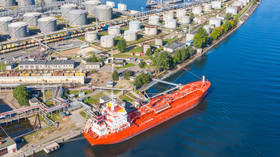G7’s Russian oil price cap not working – FT

The price cap on Russian oil introduced by the G7 and EU is being completely ignored, as almost no seaborne crude cargos have been traded below the $60-a-barrel limit, the Financial Times reported on Tuesday, citing Western officials and Russian export data.
The mechanism, which was put in place to reduce Moscow’s export revenues, was introduced in December 2022, and this February was followed by similar restrictions on exports of Russian petroleum products.
According to the FT, one senior EU official acknowledged that Moscow has been successfully sidestepping the cap, as “almost none” of the crude shipments were sold at or below the price limit.
These concerns were confirmed by Russia’s official statistics, which show that the average price of oil sold in October was $80 a barrel.
“The latest data makes the case that we’re going to have to toughen up… there’s absolutely no appetite for letting Russia just keep doing this,” the official said.
EU officials are now considering ways to reinforce the price cap, including options to restrict Russia’s access to the used oil tanker market. Russia has reportedly moved crude exports on a fleet of aging tankers, or ‘shadow fleet’, on which the price restrictions have limited traction.
The average cost of the main export, Urals oil, surged above the $60 cap this summer after it rallied due to supply and export cuts introduced by Russia and Saudi Arabia along with other members of the OPEC+ group.
The surge in Russian oil prices dealt a blow to Western efforts to curtail Moscow’s energy revenues, as nearly all seaborne flows of Russian crude went without Western insurance in August – evidence that the international sanctions are being circumvented, the outlet said.
While Moscow’s revenues from oil and gas sales dropped by 46% year-on-year in January to 426 billion rubles ($4.6 billion) after the price cap was first enforced, they have since risen dramatically. According to the latest data from the Russian Finance Ministry, the country’s oil and gas revenues stood at 1.635 trillion rubles ($17.6 billion) in October, more than doubling month-on-month and up by more than a quarter from October 2022.
For more stories on economy & finance visit RT's business section













